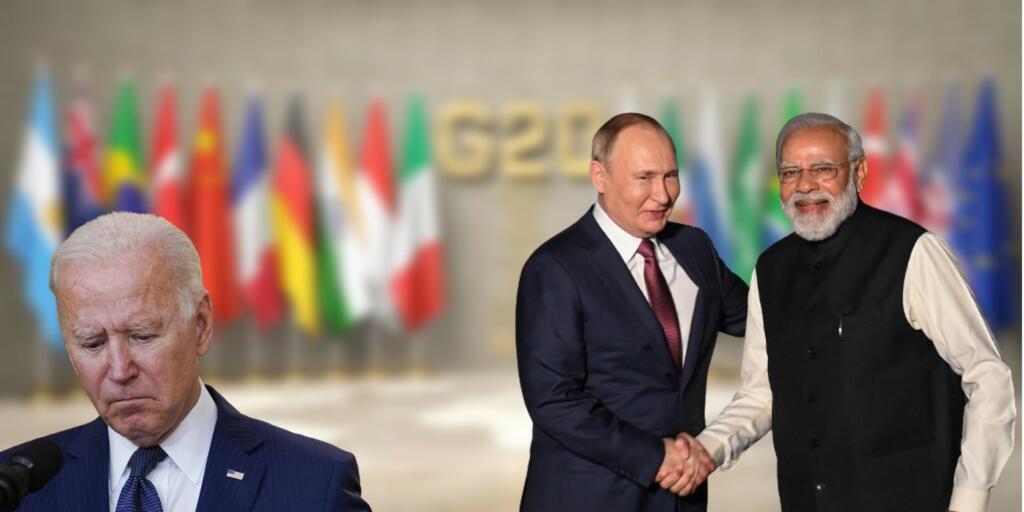Truth hardly matters in geopolitics. There are so many interest groups that even truth has to be assimilated in a favourable narrative in order to bring it to the forefront. The deliberations on the Ukraine-Russia crisis are prime examples of this phenomenon. If not for India, Russia would have lost the narrative war.
India’s role in G20 declaration
For the past few days, people were puzzled about G20’s reluctance to take an extreme stand on Russia. The G20 declaration did deplore Russia, but was equally appreciative of Russian effort to ease food insecurity during the time of crisis. Surely, west, the dominant section of G20 has its reason to do so since “winter is coming.” But that is too simplistic to be an analysis.
Turns out, India played a big role in choosing the words to describe the offensive. India wanted to ensure that G20’s words are in line with PM Modi’s “now is not the time for war”. Now, even White House has confirmed it.
Abstainment after abstainment
This seems to be a final frontier in India’s efforts to clear the air around the Ukraine-Russia crisis. Right from the get go, India has conveyed that it is in favour of giving space for clear and conscious discussion. When the UNSC came down heavily on Russia, India abstained and expressed disappointment over western countries giving up on diplomatic solutions.
In UN Security Council meeting on #Ukraine today, India abstained on the vote on draft resolution.
Our Explanation of Vote ⤵️ pic.twitter.com/w0yQf5h2wr
— Amb T S Tirumurti (@ambtstirumurti) February 25, 2022
Two days later, India again abstained on procedural vote by the UNSC to call an emergency UNGA on the issue. There again India pitched for a diplomatic solution by asking both parties to talk. Finally, when the UNGA sat to criticise Russia, India again abstained. The very next day, India stood with Russia in IAEA and UNHRC as well.
Purpose behind multiple abstentions
The West assumed that India did it because it wanted to evacuate students and buy cheaper oil from Russia. They were partly true, but there is another side of the story. As soon as war started, Russia’s side of the story was virtually censored by liberal western media. People talking about NATO’s expansionism and Zelenskyy’s autocracy could be counted on fingertips. On the other hand, the narrative on the other side was dominating the debate.
By its abstentions, India effectively told the world that Russia had its concerns as well. India is the leader of the global South and its vote matters for more than 100 countries. Slowly, the world started to see the evil in Zelenskyy. Reports of propaganda war by the Comedian turned president and his western allies started to come out. The US and its partners felt jittery and called India at G7. Sadly, even Biden actively courting PM Modi did not help them and India maintained its stance.
Russia is being heard
Few months later, Russia got its much deserved opportunity to put its point forward at the SCO Summit. PM Modi took the West into confidence by telling Putin to not engage in war. In return, Putin got an opportunity to tell the world that it is not him, but Zelenskyy who does not want peace.
It was a much needed fuel for Putin. After that, it became easy for Putin to carry on with changes in geographical landscapes in erstwhile Ukraine. India abstained from UNGA vote on referendum in 4 regions of erstwhile Ukraine. 4 days ago, India took the same stand on Russian reparations to Ukraine.
Amidst all this, Zelenskyy is continuing with his war-mongering. His army fired a Russian made missile on Poland and tried to tell the world that Russia did it. It did not work and would not be an exaggeration to say that PM Modi’s presence at G20 played a key role in it. Thanks to India, the world is relearning to trust Russia.
Support TFI:
Support us to strengthen the ‘Right’ ideology of cultural nationalism by purchasing the best quality garments from TFI-STORE.COM
